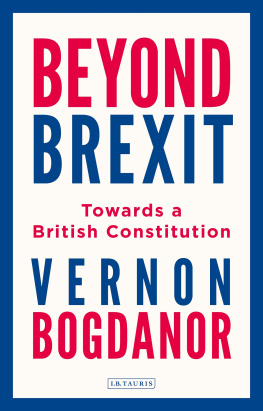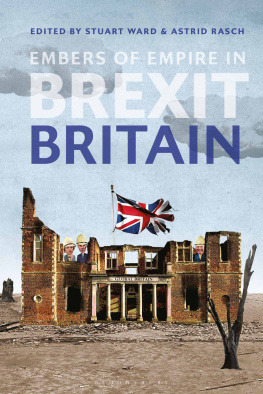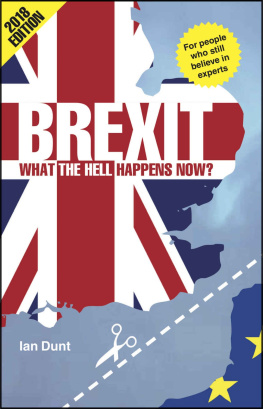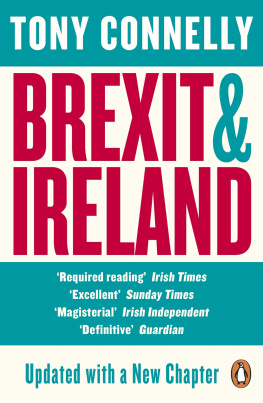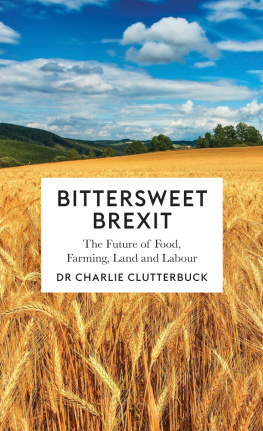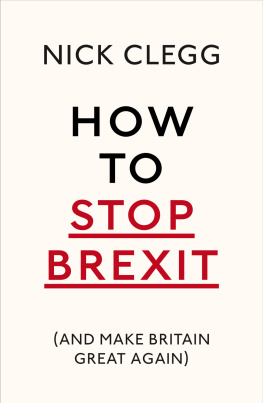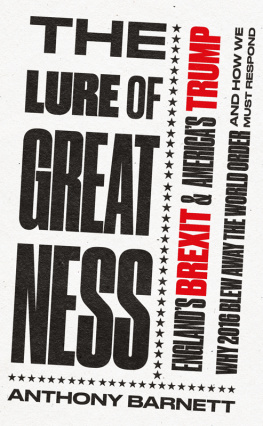Pelle Neroth Taylor - Brexit: European Union, American Empire
Here you can read online Pelle Neroth Taylor - Brexit: European Union, American Empire full text of the book (entire story) in english for free. Download pdf and epub, get meaning, cover and reviews about this ebook. year: 2016, genre: History. Description of the work, (preface) as well as reviews are available. Best literature library LitArk.com created for fans of good reading and offers a wide selection of genres:
Romance novel
Science fiction
Adventure
Detective
Science
History
Home and family
Prose
Art
Politics
Computer
Non-fiction
Religion
Business
Children
Humor
Choose a favorite category and find really read worthwhile books. Enjoy immersion in the world of imagination, feel the emotions of the characters or learn something new for yourself, make an fascinating discovery.

- Book:Brexit: European Union, American Empire
- Author:
- Genre:
- Year:2016
- Rating:5 / 5
- Favourites:Add to favourites
- Your mark:
- 100
- 1
- 2
- 3
- 4
- 5
Brexit: European Union, American Empire: summary, description and annotation
We offer to read an annotation, description, summary or preface (depends on what the author of the book "Brexit: European Union, American Empire" wrote himself). If you haven't found the necessary information about the book — write in the comments, we will try to find it.
Brexit: European Union, American Empire — read online for free the complete book (whole text) full work
Below is the text of the book, divided by pages. System saving the place of the last page read, allows you to conveniently read the book "Brexit: European Union, American Empire" online for free, without having to search again every time where you left off. Put a bookmark, and you can go to the page where you finished reading at any time.
Font size:
Interval:
Bookmark:
Brexit: European Union, American Empire
Contents
The British Brexit vote was a vote against immigration. But Brexit an abbreviation of Br itish Exit - was also a vote against the British, globalised elite, mostly living in London. It was a cry from the neglected British working class. It was indirectly a vote against the American hegemonic capitalism that has taken hold of the world since the fall of the Berlin Wall that system which allowed London, and the elites based there, to flourish. The neoconservative Washington Post newspaper predictably described it as a victory for Putin, and implied he had something to do with the out vote. A bizarre allegation. Was he secretly funding Boris Johnson, perhaps? Circulating on social media was a well-drawn cartoon: twelve golden fish in a blue lake like the twelve stars in the EU flag and a bear, symbolising Russia, scooping one of the fishes: Britain. A clever joke. The golden circle of European unity broken. What would the bear scoop up next? Putin was picking off the European states, one by one.
With respect, Washington Post and other American neocons, American influence on the world through a system underpinned by its geopolitical power, and which furthers its geopolitical clout is much greater than the puny, marginal influence of Russia. Russia is a weak, mildly revisionist rebel power on the periphery of the global system completely dominated by the United States. Russia is a straw man, used instrumentally by organs of the global and American elite, such as the Wall Street Journal and the Economist, to divert attention from the American systems own growing loss of legitimacy, as evidenced by the growth of so-called populist movements in Europe..
The world is not divided into left versus right anymore, or the bureaucrats of Brussels versus the buccaneering English, yearning for freedom that old Eurosceptic trope. No one knows of any alternative to capitalism. But the primacy of the nation state is still a very much contested area. So you could say that the conflict line of today involves the masses versus the global elite, the people who believe in the nation state versus the post nationalists, an elite who operate within an American imperial hegemony.. Thanks to Britains Trojan horse role in weakening the European political unity project, it is too simplistic to call the European Union an anti-capitalist bureaucratic monster, as some Eurosceptics maintain; it is more like a playground for international corporations who work in hand in hand with the Brussels bureaucrats to form legislation that makes it easier for big business to operate across borders, flattening differences between European nation states and bypassing national democratic forums. Precisely because the Single Market has trumped the political project, Europe is too weak, too disunited, to be able to create a different system, to impose itself on the world. Europe plays by American rules; and is buffeted and affected by American decisions and political, social and cultural influences.
Therefore you cant talk of European Union without mentioning the shadow hovering over it: the American Empire.
Not many people know that the EU was given a decisive push into existence in the early 1950s by the CIA. After that, the United States has always been careful to promote Atlanticist, pro-European community governments in every member state. A European government that was pro-European community (later pro-European Union) also tended to serve American interests. For a long time, the US struggled with the British left, which for generations had been incorrigibly Eurosceptic; until Tony Blair and his third way did several things: he brought Britain closer to America, Britain closer to Europe, breaking with Labour tradition, and his vision of a Single Market Europe accorded with American priorities.
There are other vectors: America was a country which developed cultural propaganda and civil legislation to cope with its multi-ethnic population at early stage. Many of these influences came to Europe, transmitted via popular culture, so that the ethnicization of Europe into a society that ethnically more and more resembled the United States has come to be seen as normal. Many NGOs in Europe borrowed from the American civil rights movement (often Jewish run) in agitating for positive discrimination and speech codes to make immigrants feel more comfortable. Today, as America becomes increasingly diverse under a black president, in an unholy alliance between the mainstream Republican business right and the multicultural left, Europe is feeling the cultural pressure to be more and more like the United States in its own accelerating diversity. Since, in Europe, the mainstream left has abandoned the interests of the white working class to become signed up globalists, populist parties have emerged to fill the vacuum: these populists have an agenda of protecting the nation state, the welfare state, and, not least, the interests of the white, native, working class population. In Europe, mainstream right and mainstream left are crowded in the same, narrow section of the spectrum; they are supportive of international business and finance, careless of the negative effects of immigration. In Germany the effect has been particularly strong, arguably in part due to the legacy of American denazification procedures after the war that discredited even healthy survival instinct nationalism. Britain also, due to Blair, has become more post national, more embedded in the EU. While Sweden is another country that has pioneered the post-national ethos; Swedes always like to try to place themselves in the vanguard of political change. The country has never been occupied; that helps. And Sweden has always been culturally very pro-American. In contrast, in some places, such as Hungary, where Anglo-Saxon influences have always been weak, and where the legacy of communism has bred a suspicion of transnational projects, national parties as opposed to the international parties - are actually in power and detested by American diplomats for not lining up with Washington.
Until the 1990s, European socialists and conservatives offered alternatives; with the leftists usually the more anti-American choice. Then, with the fall of the Berlin Wall, the differences between left and right narrowed; not least in Britain, where Blairism was the result. Socialism was discredited everywhere by the collapse of the Soviet bloc. Economic equality was replaced by gender equality and gay rights: equality of identity trumped equality of the wallet. American capitalism was the only show in town; but capitalism could be harnessed for the egalitarian project if not domestically, perhaps, then through a philosophy of open borders narrowing global inequalities by flooding Europe with immigrants, and giving immigrants a leg up and a chance to earn first world wages. At the same time, these wages put competitive downwards pressure on wages, benefiting business.
American influence isnt just in creating cultural acceptance for immigration and its general support for pan-European capitalism, and a Brussels based political system set up to serve that market, which has led to corrosive effects on national democracies: Americas interventions in the Middle East in order to protect Israel have created chaos, which has produced large immigration and refugee flows to Europe. All this has been hugely unpopular, and it was the British who have taken the first decisive step against it. The Brexit vote arguably represents a modern revolution by all the losers of globalisation and European Union. The EU was good for talented and enterprising middle class individuals who had education and social capital they could settle anywhere in Europe; Europe was their oyster; university tuition at local rates could be enjoyed. No visas, no residence permits needed. But the EU meant little to white van man in Dagenham or Gateshead, who didnt or couldnt enjoy the freedom to move, let alone spoke foreign language; for this segment of the population, the Americanisation of Europe through the European Union has meant mostly inwards immigration and a sense of alienation, boosting the power of employers who have had access to cheap labour but also a perception that immigration has weakened employment conditions: zero hours contracts, low-skilled jobs, the replacement of craftsmanship and working class pride by automation and McService jobs.
Font size:
Interval:
Bookmark:
Similar books «Brexit: European Union, American Empire»
Look at similar books to Brexit: European Union, American Empire. We have selected literature similar in name and meaning in the hope of providing readers with more options to find new, interesting, not yet read works.
Discussion, reviews of the book Brexit: European Union, American Empire and just readers' own opinions. Leave your comments, write what you think about the work, its meaning or the main characters. Specify what exactly you liked and what you didn't like, and why you think so.

